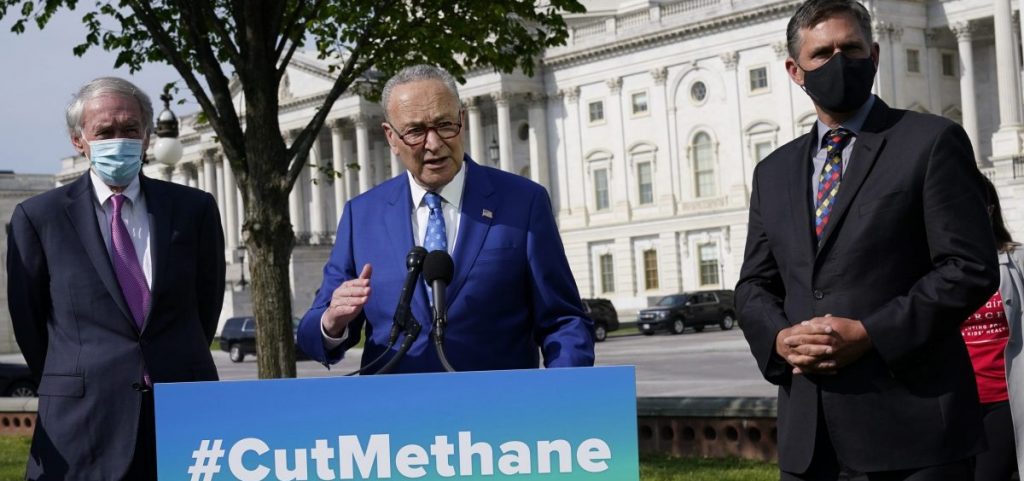News
Congress Votes To Restore Regulations On Climate-Warming Methane Emissions
By: Jeff Brady | NPR
Posted on:
WASHINGTON, D.C. (NPR) — Both houses of Congress have taken a step toward more vigorously regulating climate-warming methane leaks from the oil and gas industry, a move supporters say is key to achieving President Biden’s ambitious climate goals.
On Friday, House lawmakers voted to reverse a Trump rollback by passing resolutions under the Congressional Review Act, which gives them the ability to undo agency rules passed in the last months of the previous administration. The Senate approved the measure in April.
“What we’re voting on today is the legislative equivalent of a double negative. This is the repeal of a repeal,” Sen. Angus King, I-Maine, said at a press conference before the April vote.
Biden is expected to sign the resolutions, which would reverse an Environmental Protection Agency methane rule finalized last year and leave in place a stricter 2016 EPA rule, finalized during the Obama administration.

Reducing greenhouse gases, means tackling pollution from the oil and gas industry
Methane is the main ingredient in natural gas. When released before it burns, it’s a far more potent greenhouse gas than even carbon dioxide. But it does not linger in the atmosphere nearly as long. That means eliminating leaks now could have an immediate effect on global warming.
The National Oceanic and Atmospheric Administration said in April that methane and carbon dioxide “continued their unrelenting rise in 2020 despite the economic slowdown caused by the coronavirus pandemic response.”
The oil and gas industry is the largest source of human-caused methane emissions. A recent study by the Environmental Defense Fund found that cutting methane emissions now could slow the rate of global warming by as much as 30%.
“It is so harmful to the Earth’s climate and our ability to meet our greenhouse gas reduction goals, that we simply can’t meet those goals unless we address this pollution from oil and gas operations,” the EDF’s Dan Grossman says.
The House vote Friday was largely along party lines, with 12 Republicans joining Democrats in supporting the resolution.
“Getting this legislation approved today is a big win in our overall effort to combat the climate crisis, and a critical first step toward sufficiently reducing our nation’s overall methane emissions,” said Rep. Diana DeGette, D-Colo.
Republicans opposed to the resolution argued it would lead to higher gasoline prices.
“This resolution is another attack on the hardworking American men and women that supply energy — so important to our economy and our national security,” said Rep. Cathy McMorris Rodgers, R-Wash.
The April Senate vote was largely along party lines as well, with a few Republican senators, including Susan Collins of Maine, Lindsey Graham of South Carolina and Rob Portman of Ohio, voting in favor of the resolution.
Sen. Martin Heinrich, D-N.M., said in his oil-producing state methane leaks from various points of the production process, including wells and pipelines.
“So much so that a few years ago NASA actually could see the methane plume sitting over the northwest portion of my state,” Heinrich said at a press conference before the April vote.
Republican Shelley Moore Capito, of West Virginia, was one of the Senate resolution’s opponents.
“We shouldn’t demonize an industry that is part of the lifeblood of our economy,” she said, also calling the vote a “political stunt” and echoing industry arguments that it’s reducing methane emissions even as gas use increases.
Where oil and gas industry players fall on the issue may depend on their size
But the oil and gas industry is split over this issue. Larger companies generally support the Obama-era rules, while smaller companies oppose them.
Big oil is heavily invested in natural gas and worries that if methane emissions aren’t controlled, it could undermine arguments that gas is a cleaner-burning fossil fuel than coal.
“We cannot make the climate case for the widespread use of natural gas if we don’t manage and contain it,” says Shell U.S. President Gretchen Watkins in a statement to NPR. Other large oil companies expressed similar views on Twitter, including BP, Equinor and Total.
Smaller drillers worry stricter regulations will be expensive. They prefer voluntary measures to limit methane emissions.
“IPAA supports cost-effective methane emissions management under the Clean Air Act, but it believes that specific standards are needed for small businesses and low production wells,” says Lee Fuller, executive vice president of the Independent Petroleum Association of America. His group says some wells produce just a few barrels a day and could become unviable with stricter regulations.
The Senate and House votes come as Biden has called for dramatically reducing greenhouse gas emissions to address climate change. His climate change plan calls for a carbon-neutral power sector by 2035 and for the broader economy to be carbon-neutral by 2050.
9(MDI4ODU1ODA1MDE0ODA3MTMyMDY2MTJiNQ000))

